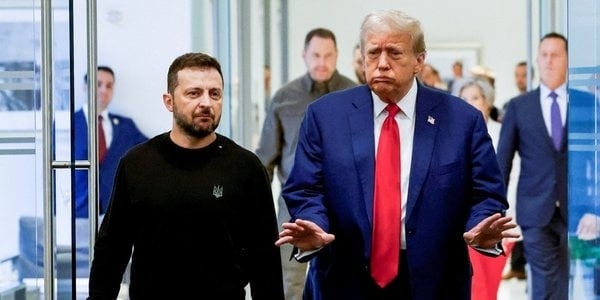In a peace proposal, Trump suggests Ukraine should give up territories seized by Russia and NATO, according to Reuters.

Trump's peace plan suggests Ukraine should relinquish territories seized by Russia and NATO, – Reuters
Reuters has analyzed the proposals from advisors to the elected US President Donald Trump regarding a peace plan, which involves handing over a significant part of Ukraine to Russia "in the near future."
This was reported by Reuters.
"Donald Trump's advisors are publicly and privately putting forward proposals to end the war in Ukraine, which would lead to a substantial portion of the country ceding to Russia in the near future, according to an analysis of their statements and interviews with several individuals close to the newly elected US President, conducted by Reuters."
It is reported that Trump's advisors will attempt to compel Moscow and Kyiv to negotiate using both incentives and threats, including the cessation of military aid to Kyiv if it refuses to negotiate, but also increasing aid if Russian President Vladimir Putin declines.
Overall, the statements from his advisors provide insight into the potential contours of Trump's peace plan, the agency writes.
Ukrainian President Volodymyr Zelensky, who is facing a shortage of human resources and growing territorial losses, has indicated that he may be open to negotiations.
Despite still intending to join NATO, he stated this week that Ukraine needs to find diplomatic solutions to regain some occupied territories.
Reuters reminds that in May, Putin was ready to halt the war through negotiations for a ceasefire that would recognize the existing front lines, but expressed willingness to continue fighting if Kyiv and the West did not respond to this.
According to four advisors who wished to remain anonymous to discuss private conversations, as of last week, Trump had not yet convened a central working group to develop a peace plan. They noted that several advisors were exchanging ideas among themselves at public forums, and in some cases, even with Trump.
Ultimately, any peace agreement will likely depend on direct personal interaction between Trump, Putin, and Zelensky, the advisors told Reuters.
One of Trump's former national security officials involved in the transition process stated that there are three main proposals: the Kellogg plan, the plan of newly elected Vice President JD Vance, and the plan of Richard Grenell, the former acting Director of National Intelligence under Trump.
The Kellogg plan, co-authored with former National Security Council staffer Fred Fleitz and presented to Trump earlier this year, proposes freezing the current front lines.
It is suggested that Trump would provide more American weapons to Kyiv only on the condition of agreeing to peace negotiations. At the same time, he would warn Moscow that he would increase American aid to Ukraine if Russia refuses to negotiate. Ukraine's NATO membership would be put on hold.
Ukraine would also be offered American security guarantees, which could include increased weapons supplies after an agreement is reached, according to this proposal.
Vance, who as a US senator opposed aid to Ukraine, put forward a separate idea in September.
He told American podcaster Sean Ryan that the agreement would likely include a demilitarized zone along the existing front line, which would be "heavily fortified" to prevent further Russian incursions. His proposal would deny Kyiv NATO membership.
Grenell, Trump's former ambassador to Germany, advocated for the creation of "autonomous zones" in eastern Ukraine during a Bloomberg roundtable in July, but did not elaborate on his position. He also suggested that Ukraine's NATO membership is not in America's interest.
According to analysts and former national security officials, some of these proposals are likely to face resistance from Ukrainian President Volodymyr Zelensky, who has made the NATO invitation part of his "Victory Plan," as well as from European allies and some American lawmakers.
Last week, Ukraine's foreign minister sent a letter to his NATO counterparts urging them to provide a membership invitation at the foreign ministers' meeting on Tuesday.
Some European allies expressed readiness to increase aid to Ukraine, while US President Joe Biden continues to send weapons. "This could cost Trump certain leverage to force Kyiv to come to the negotiating table," writes Reuters.
The Kellogg plan, which includes increasing aid to Ukraine if Putin does not negotiate, could face backlash in Congress, where some of Trump’s closest allies oppose additional military assistance to the Eastern European nation.
"I don't think anyone has a realistic plan for how to end this," said Rumer, a former US intelligence officer.
A Romanian presidential candidate threatened to stop aid to Ukraine if electedIn Mykolaiv, a Fiat struck a pedestrian: the injured person was taken away by ambulance